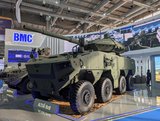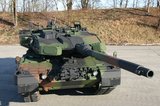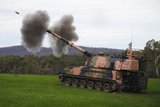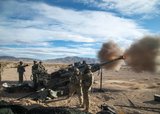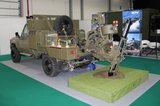Rheinmetall expands hydrogen fuel cell activities
Boxer 8x8 vehicle. (Photo: Rheinmetall)
Rheinmetall is joining a national hydrogen fuel cell initiative in Germany as a partner in a new Innovation and Technology Centre, with financial support from the German federal government and the state of North Rhine-Westphalia.
The company has been developing and producing products for fuel cell systems for more than 20 years. In recent months alone, the company received orders in this field totalling about €50 million ($59 million).
From now on, Rheinmetall stated that it will draw on its experience and expertise in this domain to position itself even more firmly as a leader in hydrogen and fuel cell technology. This could translate into Rheinmetall upgrading some of its military vehicles, like the Boxer, with hydrogen fuel cell technologies.
Hydrogen, a key element against climate change, presents substantial global growth opportunities among all its stages (production, storage, distribution and use). The current market volume of €5 billion is predicted to exceed €100 billion by 2030.
More from Land Warfare
-
![US Army plans Q2 prototype proposal request for its Mobile Tactical Cannon programme]()
US Army plans Q2 prototype proposal request for its Mobile Tactical Cannon programme
The US Army is seeking a mature 155mm, wheeled, self-propelled capability to replace the towed M777 howitzer in the Stryker, Mobile and Infantry Brigade Combat Teams as it targets a potential 498-unit acquisition goal.
-
![British Army’s Project Stokes 120mm mortar bids due in March 2026]()
British Army’s Project Stokes 120mm mortar bids due in March 2026
Project Stokes could see a new 120mm mortar capability enter British service, with domestic production and international partnerships central to competing bids.
-
![MKJ Warrior Series — The Nett Warrior Qualified Connector for Today’s Soldier Systems]()
MKJ Warrior Series — The Nett Warrior Qualified Connector for Today’s Soldier Systems
ITT Cannon’s MKJ Warrior connectors are designed for the harshest environments, delivering mission critical comms, navigation and USB data/power.









